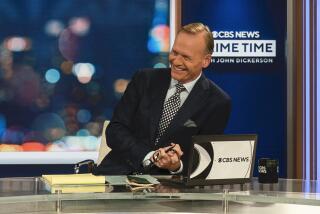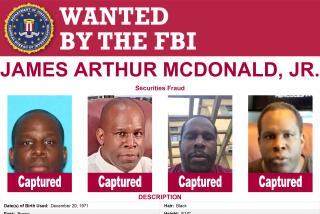CNBC makes in-depth programming its business
NEW YORK — Both times it aired in October, the CNBC documentary “The Age of Wal-Mart” attracted larger audiences than any other business program on the network that week.
That’s not particularly noteworthy until you consider that they were reruns. More than a rerun: The Peabody Award-winning film is two years old and CNBC has shown it 44 times.
Television executives notice those kinds of numbers, and the trend explains how Josh Howard got his job 10 months ago, running a newly formed documentary unit at CNBC and preparing the network’s first newsmagazine for its December debut.
“It just tells you that there’s a real appetite for in-depth documentaries on people and trends [in business],” said Mark Hoffman, CNBC president.
The unit’s next film, “Big Brother, Big Business,” premieres at 6 p.m. today. It’s about all the little-known ways that businesses can spy on and collect information about their employees and customers, and follows last month’s well-received documentary on the inner workings of American Airlines.
It’s a challenging time at CNBC, which is facing job cuts because of parent NBC Universal’s recent directive to cut costs and a potential challenge from a new business network under consideration by the creators of Fox News Channel.
After failures with John McEnroe and Dennis Miller, CNBC under Hoffman has been trying to make prime-time programming that’s more consistent with the business-oriented news that dominates its daytime schedule.
CNBC’s average prime-time audience this year of 128,000, according to Nielsen Media Research, is a fraction of industry leader Fox News Channel’s 1.4 million. But CNBC’s numbers have inched up from last year. The two airings of the Wal-Mart documentary on Oct. 15 averaged 236,000 viewers, and the two premiere showings of “Inside American Airlines: A Week in the Life” averaged 345,500 people.
Documentaries are costly, particularly compared to studio shows with a couple of people talking, and that’s why they’ve become an endangered species at broadcast networks.
But a broadcaster won’t show a documentary 44 times. If a lower-budget cable network can get this kind of a ride from a film and maintain ratings, it makes the expense worthwhile, executives said.
American Airlines offered CNBC extraordinary access for the two-hour film, in which executives and labor representatives talked in detail about steps taken to save money during a challenging time in the industry. They explained why ticket prices on the same flight could vary so widely, and why they abandoned American’s much-advertised plan to offer more leg room in coach than competitors -- they needed the extra revenue from squeezing in more seats.
Today’s “Big Brother, Big Business” details the wealth of public information about people that many don’t know exists. For example, Google has a record of every search made on its website and who made it. Some new cars are equipped with black boxes that record how fast a driver went, and this information was used to convict one motorist of manslaughter in an accident, Howard said.
A rental car company installed GPS devices in its cars and, until stopped by a court, charged exorbitant fees to drivers who crossed a state line -- a restriction that had been buried in the fine print of a contract offering unlimited mileage, he said.
“It was a perfect subject for us,” Howard said. “It sheds light on a growing industry.... But it also appeals to just about everybody who has used a credit card, rented a car or applied for a job.”
Howard is also in charge of CNBC’s newsmagazine, which doesn’t have a title yet but is scheduled to debut Dec. 6. It’s modeled after HBO’s “Real Sports” in having one fresh episode each month that is repeated multiple times.
The newsmagazine will have three stories a month, a mixture of profiles, investigative pieces and features. That’s a comfortable format for Howard, who spent many years at CBS’ “60 Minutes” and was executive producer of the now-defunct “60 Minutes II.”
The job is an unexpected second chance for Howard, who was forced to resign from CBS when, on his watch, Dan Rather’s 2004 story about President Bush’s National Guard service collapsed because the authenticity of documents could not be verified.
Howard expected to leave television news after his job running “60 Minutes II” evaporated, and wasn’t sure if there would be a stigma attached to him.
“I saw this as an opportunity to try something completely different,” Howard said. “I didn’t think I could ever top ’60 Minutes,’ so maybe this was an opportunity to do something outside of television.” But the CNBC job intrigued Howard.
Howard is one of television news’ great producers of long-form television, Hoffman said. He said he studied the issues surrounding the National Guard case and dismissed it as “irrelevant to what he could contribute at CNBC.” There have been no outside complaints or questions about Howard getting the job, he said.
More to Read
The biggest entertainment stories
Get our big stories about Hollywood, film, television, music, arts, culture and more right in your inbox as soon as they publish.
You may occasionally receive promotional content from the Los Angeles Times.










